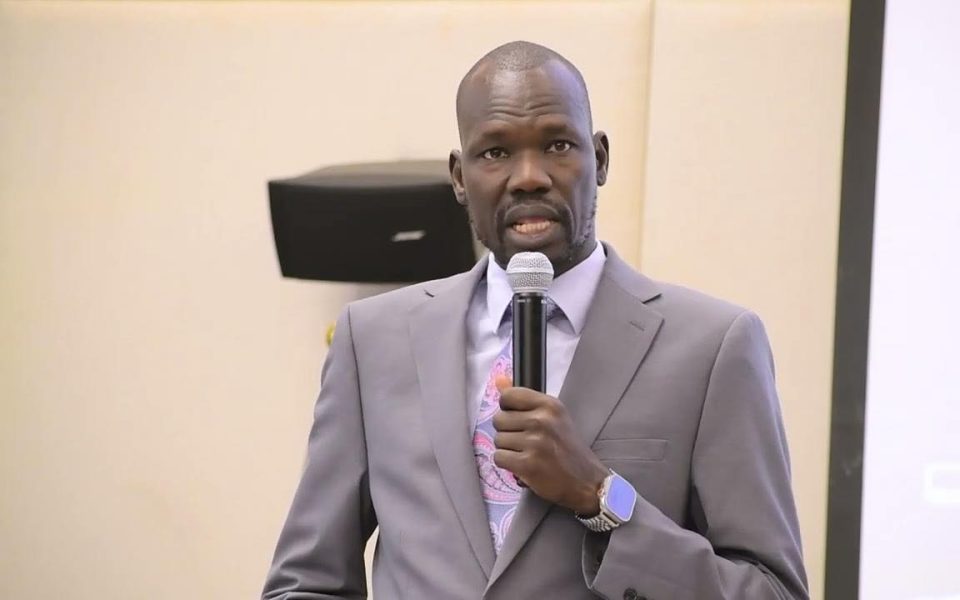
South Sudan’s already fragile justice system is under the microscope after glaring misquotations in the charge sheet against suspended First Vice President Dr. Riek Machar triggered heated debate about the competence, independence, and political neutrality of the country’s judiciary.
The case, formally titled Republic of South Sudan vs. Dr. Riek Machar Teny Dhurgon and others, has rapidly evolved into more than just a courtroom matter.
It now represents a test of the nation’s ability to uphold the rule of law in the face of political pressures.
At the center of the storm is Justice Minister Joseph Geng Akech, whose charge sheet misquoted five out of six legal provisions—an error critics argue no seasoned legal officer should make.
“Murder” was correctly cited under Section 206 of the Penal Code Act, but other charges such as Conspiracy, Terrorism, Treason, Destruction of Property, and Crimes Against Humanity were attributed to statutes that either do not exist, belong to unrelated offenses, or were fabricated outright, one legal analyst claimed.
The blunders have sparked uproar. For some, they expose a dangerous level of incompetence. For others, they confirm suspicions that the case is less about law and more about politics.
“Even a first-year law student wouldn’t confuse ‘Housebreaking by Night’ with ‘Destruction of Public Property,’” wrote Dr. Sunday de John, one of the country’s top political analysts, in an open letter to President Salva Kiir.
“This is not just embarrassing, it is damaging to the entire justice system,” he added.
Amid mounting criticism, the Ministry of Justice issued a clarification on Friday, admitting the minister had cited the wrong constitutional article during Thursday’s high-profile press briefing on the Nasir incident, which forms the basis of the charges against Machar and several senior SPLM-IO leaders.
“The mistake was limited to the press document and has no bearing on the legal process,” the ministry said.
It stressed that the “correct provisions of the law” are properly recorded in the official case diary before the court, adding that the briefing was intended to inform the public, not serve as a legal instrument.
Still, the damage to public trust may already be done. Opposition figures and civil society activists argue that repeated errors from the minister—already dogged by accusations of nepotism and questionable academic credentials, are signs of deeper institutional rot.
The scandal has escalated to calls for accountability at the highest level of the justice sector.
A growing chorus of voices, including opposition leaders, civil society activists, and independent lawyers, is demanding that Minister Joseph Geng Akech and his legal team either resign or be dismissed.
“South Sudan cannot entrust its most sensitive cases to a minister who cannot even quote the law correctly,” said one outspoken activist in Juba.
“If he cannot step aside voluntarily, the President must relieve him of duty before the damage becomes irreversible.”
Others argue that the blunders have already undermined South Sudan’s credibility internationally. “The longer Joseph Geng remains in office, the more this government looks like it tolerates incompetence,” noted a civil society representative. “Firing him and his team would be the first step toward restoring confidence in our justice system.”
The crisis has also triggered appeals for presidential intervention. In a letter to President Kiir, veteran lawyer Paul Dhel Gum urged the head of state to exercise his constitutional oversight before the case degenerates into a full-blown scandal.
“Without debating the guilt or innocence of the accused persons, I respectfully request that you direct the Minister of Justice to invoke Section 25 of the Code of Criminal Procedure Act 2008, Stay of Criminal Proceedings,” Gum wrote.
“It states that: ‘The Minister may after completion of an investigation and at any stage of inquiry and before the finding in any trial, stay the criminal proceedings against any accused on reasonable grounds’.”
According to Gum, invoking this provision would protect the country from international embarrassment and prevent further erosion of confidence in the judiciary.
UN Calls for Fair Trial
The controversy has also drawn international attention. On Friday, the United Nations urged South Sudan to ensure that any legal proceedings against Machar and seven others adhere to international standards of fairness and transparency.
“Any judicial proceeding should adhere to international standards of fairness and transparency, with full respect for the rule of law and human rights,” UN spokesperson Stéphane Dujarric told reporters in New York.
The call comes as South Sudan marks the seventh anniversary of the 2018 Revitalized Peace Agreement, a fragile accord that ended years of bloody conflict but has been slow to deliver stability.
The suspension of Machar, a principal signatory, has further heightened political tensions and raised fears of renewed instability.
“As the political and security situation continues to deteriorate, it is more important than ever that the country’s leaders put the interests of their people first,” Dujarric added.
For South Sudan, the youngest country in the world, the stakes could not be higher. Observers warn that if the judiciary is seen as incompetent or politically compromised, it risks unraveling not just one case, but public confidence in the entire justice system.
“This is not about Machar alone,” said a Juba-based constitutional lawyer. “This is about whether South Sudan can build institutions that can stand above politics. Without that, the nation’s survival and growth will remain in jeopardy.”
With nearly half of the population facing food insecurity, economic collapse worsening, and displacement on the rise, the credibility of the justice system may prove just as vital as guns and grain in holding the young nation together.

